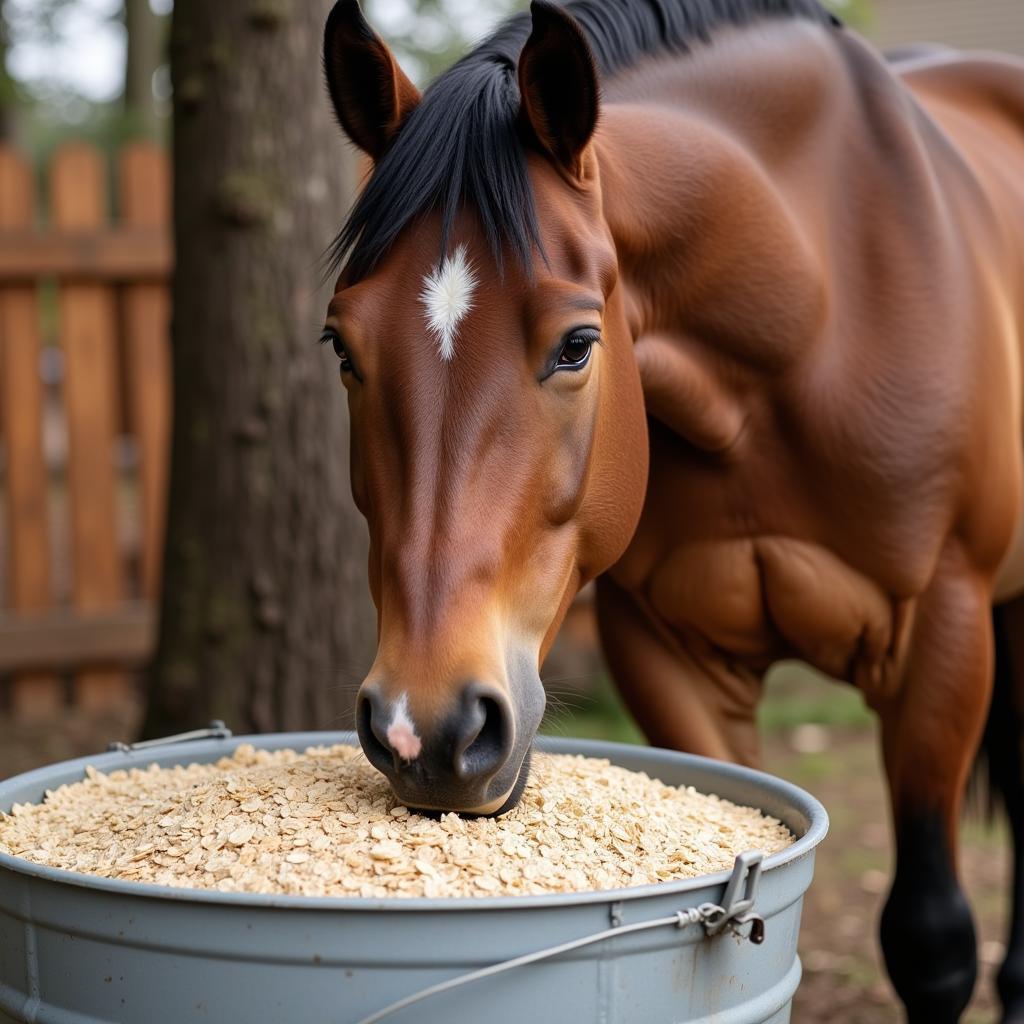Oats For A Horse are a classic feed, and for good reason. They’ve been a staple in equine diets for centuries, offering a balanced source of energy and essential nutrients. But are they the right choice for your horse? This comprehensive guide explores everything you need to know about feeding oats to horses, from their nutritional value to potential risks and best practices.
The Nutritional Benefits of Oats for Horses
Oats provide a good balance of carbohydrates, fiber, and protein, contributing to a horse’s overall health and well-being. They are a valuable source of energy, especially for horses with moderate to high energy requirements, such as those used for riding, racing, or other strenuous activities. The fiber content in oats supports healthy digestion and helps prevent colic. In addition, oats contain essential vitamins and minerals like vitamin B, iron, and zinc, which are crucial for various bodily functions. Compared to other grains, oats are lower in starch and higher in fiber, making them easier to digest and less likely to cause digestive upset. This makes them a suitable choice even for horses with sensitive stomachs.
Choosing the right type of oats is also important. Whole oats retain the outer hull, providing more fiber and promoting slower digestion, which helps maintain steady energy levels throughout the day. Rolled or crimped oats have been processed to flatten the grain, making them easier to chew and digest. This is particularly beneficial for older horses or those with dental issues.
After this section discussing the different types of oats, let’s see an image demonstrating the visual differences.
Are Oats Right for Every Horse?
While oats are generally safe and beneficial for most horses, individual needs can vary. Not all horses tolerate oats equally well. Some horses may experience digestive issues or develop metabolic conditions if fed excessive amounts of oats. Horse oats are not suitable for horses prone to laminitis, a painful hoof condition often associated with high-starch diets. For these horses, alternative feed options like low-starch hay and specially formulated feeds may be more appropriate.
Factors like age, activity level, and overall health should be considered when determining the appropriate amount of oats to include in a horse’s diet. Young, growing horses and those involved in intense training often require more energy and can benefit from a higher proportion of oats in their feed. On the other hand, senior horses or those with limited activity levels may require less energy and should be fed oats in moderation.
Feeding Oats to Your Horse: Best Practices
Proper feeding practices are crucial for maximizing the benefits of oats and minimizing potential risks. Always introduce oats gradually into a horse’s diet to allow the digestive system to adapt. Oats horse feed should be clean and free of mold or dust. Store oats in a cool, dry place to prevent spoilage.
How much oats should you feed your horse? The optimal amount depends on several factors, including the horse’s size, workload, and overall health. It’s essential to consult with a veterinarian or equine nutritionist to determine the appropriate feeding regimen for your horse’s individual needs. They can help you create a balanced diet that meets your horse’s nutritional requirements without causing digestive problems or metabolic imbalances.
 Horse Enjoying Oats from a Bucket
Horse Enjoying Oats from a Bucket
Common Concerns about Feeding Oats
One common concern is whether feeding oats can make a horse “hot” or excitable. While oats provide energy, the effect on a horse’s temperament is generally minimal when fed in appropriate amounts as part of a balanced diet. Another concern is the potential for weight gain. Horse eating oats in excess can contribute to weight gain, just like any other calorie-rich feed. Careful portion control and regular exercise are essential to maintain a healthy weight.
Conclusion
Oats for a horse can be a valuable component of a balanced equine diet, providing essential nutrients and energy. However, individual needs vary, and careful consideration should be given to the type and amount of oats fed. By following best practices and consulting with equine professionals, you can ensure your horse receives the optimal nutrition it needs to thrive.
FAQs
- Can I feed oats to my miniature horse? Yes, but in smaller quantities.
- Are rolled oats better than whole oats? It depends on the horse’s age and dental health.
- How do I store oats properly? In a cool, dry, and rodent-proof container.
- Can I mix oats with other grains? Yes, but ensure the overall diet is balanced.
- What are the signs of oat intolerance in horses? Loose stools, colic, and changes in behavior.
If you have a goat, you might be wondering if it can share your horse’s treats. Find out more on can goats have horse treats. Also, make sure your horse is prepared for all weather conditions with our selection of horse rain coats.
Other Questions?
- What are the other good alternatives for oats?
- How to transition my horse to a new type of feed?
Check out our other articles on our website for more information.
For further assistance, please contact us: Phone: 0772127271, Email: [email protected], or visit our address: QGM2+WX2, Vị Trung, Vị Thuỷ, Hậu Giang, Việt Nam. Our customer service team is available 24/7.